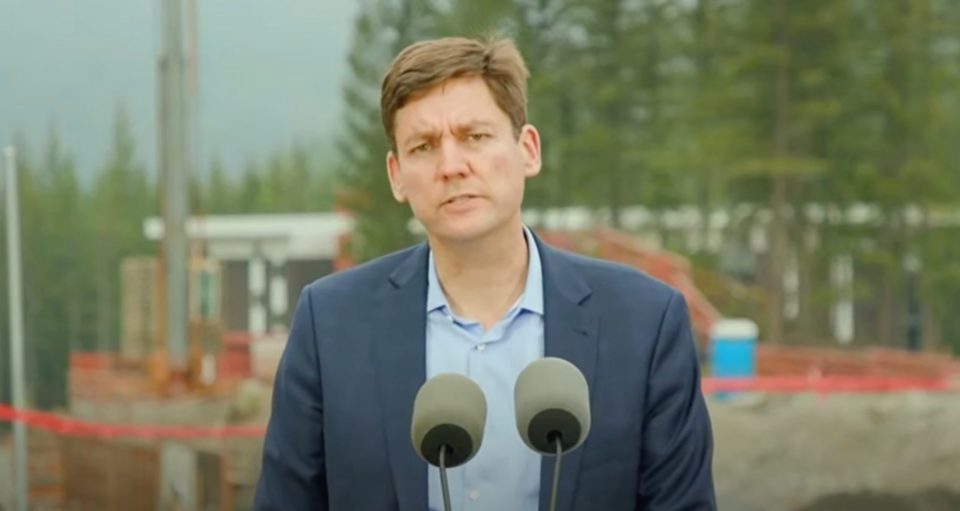In speaking about the inspiration behind the provincial government's BC Builds housing program, Premier David Eby often references both Singapore and Vienna.
"These are expensive places in the world where government takes an active role using public plans to build actually affordable housing," Eby said at a press conference in Whistler on July 22.
"But the third that I usually mention is Whistler. The leadership that’s been shown by mayor and council in using land that the city owns, publicly owned land, to build actually affordable housing, is a model for what we’re doing across the rest of the province."
Eby is in town for the summit, and used the opportunity to highlight Whistler's inclusion in the province's BC Builds program.
The government is investing $12.7 million in the Resort Municipality of Whistler's (RMOW) housing projects at 1475 Mount Fee Rd. in Cheakamus through the BC Builds program. When completed in 2026, the two, four-storey builds will amount to 104 new rental units for Whistlerites.
The province is also making more than $27 million in low-interest financing available for the project.
"As certain as snow comes to Whistler is challenges around housing. There is huge demand here in Whistler for the people who make this place amazing, the people who actually run the city of Whistler—the people who work in the restaurants, the people who work in the tourism industry, they need housing and it has been a challenge for a long time," Eby said.
"You know it might be fun when you're young to pile into a place with a bunch of roommates, but the charm wears out really quickly, and if you want to build a career and have a good middle-class life in a community like Whistler that is so tourism-dependant, where housing can be so expensive, we need better solutions.
"Whistler has come up with those solutions and the Province of BC is so proud to support the innovative work that’s been happening here in Whistler."
Launched in February, BC Builds aims to fast-track delivery of homes for people with middle incomes by leveraging government-, community- and non-profit-owned and underused land through government funding and financing.
Whistler proved a prime candidate of choice due to its much-lauded work building employee-restricted housing through the Whistler Housing Authority.
The Whistler 2020 Development Corporation is the general contractor for the project at 1475 Mount Fee Rd., while the Whistler Housing Authority will own and operate the rental homes.
Construction is expected to be complete in 2026.
“It is exciting to be one of the very first BC Builds communities,” said Mayor Jack Crompton, in a release. “This innovative program has allowed us to go from concept to construction on 104 stable, employee-restricted rental units at 1475 Mount Fee Rd. The collaboration is helping us house our community within the community. I want to thank the Province of ÎÚÑ»´«Ã½ for its support of Whistler and our growing housing needs.”
Green Party candidate Jeremy Valeriote welcomed the announcement, commending the RMOW, WHA and BC Builds for the investment.
"However, Whistler has been working on its own to build more employee housing for years—is this a campaign announcement by the premier three months ahead of an election?" he said in an email to Pique.
"The BC NDP government has introduced a to respond to a long-term problem. There was insufficient consultation with local communities prior to this province-wide upzoning, and there will be unintended consequences and blind spots to their top-down, one-size-fits-all solution. BC Greens will be there to identify where adjustments are needed, and hold the government accountable when it inevitably develops tunnel vision or blind spots on its housing solutions."
In Whistler, the upzoning results in 3,000 lots changing from single-family to fourplex zoning, Valeriote noted.
"This both increases the equity for existing landowners in terms of land value lift, and could double Whistler's population in a short time, despite the clearly identified accommodation capacity ("bed cap")," he said. "This community consensus is being dismissed out of hand by the Province in a top-down approach, resulting in a massive infrastructure deficit and increasing damage to the area’s natural environment. This threatens to turn a sustainable small mountain town into a city in the mountains, without the transportation solutions or other carrying capacity considerations required to make this massive change sustainable."



